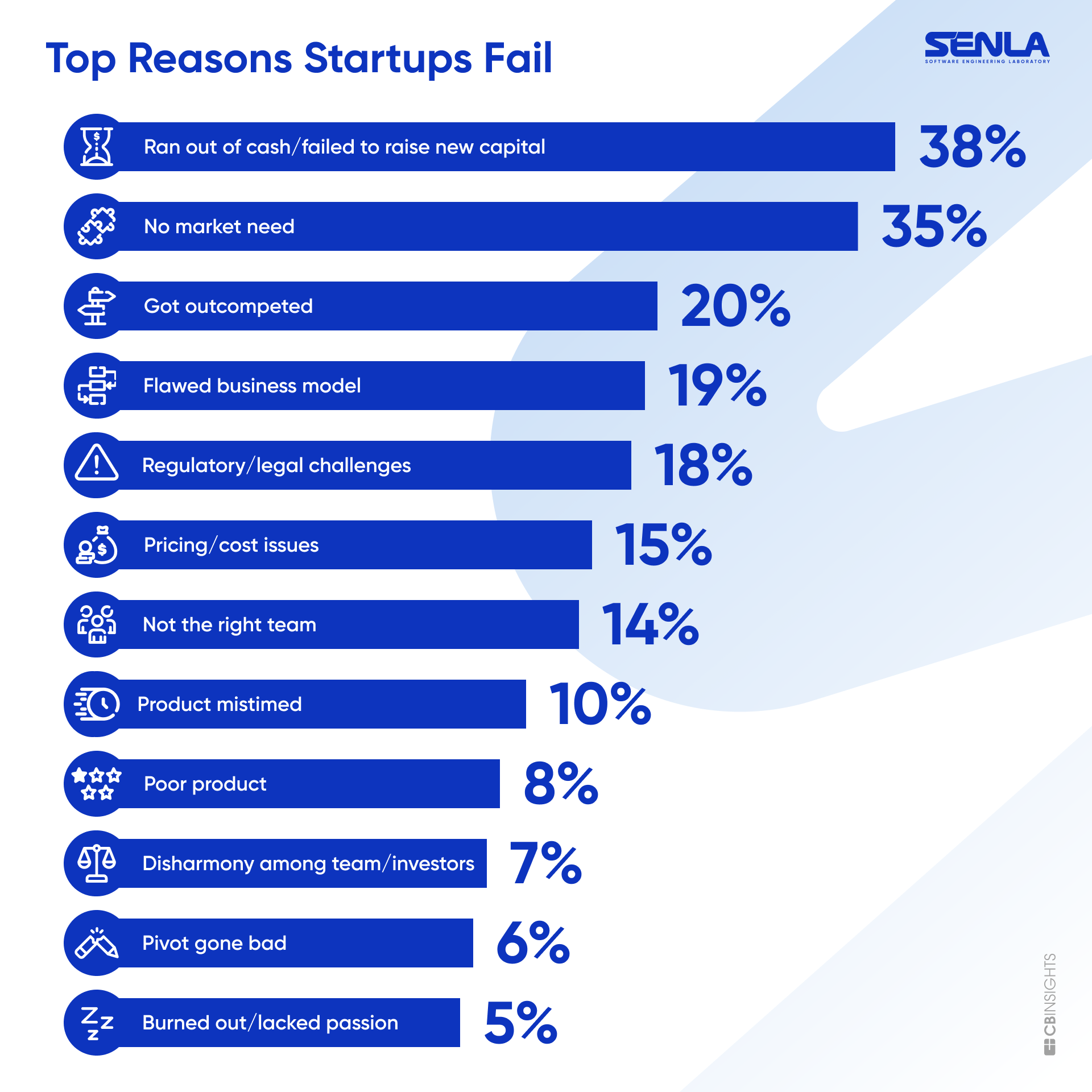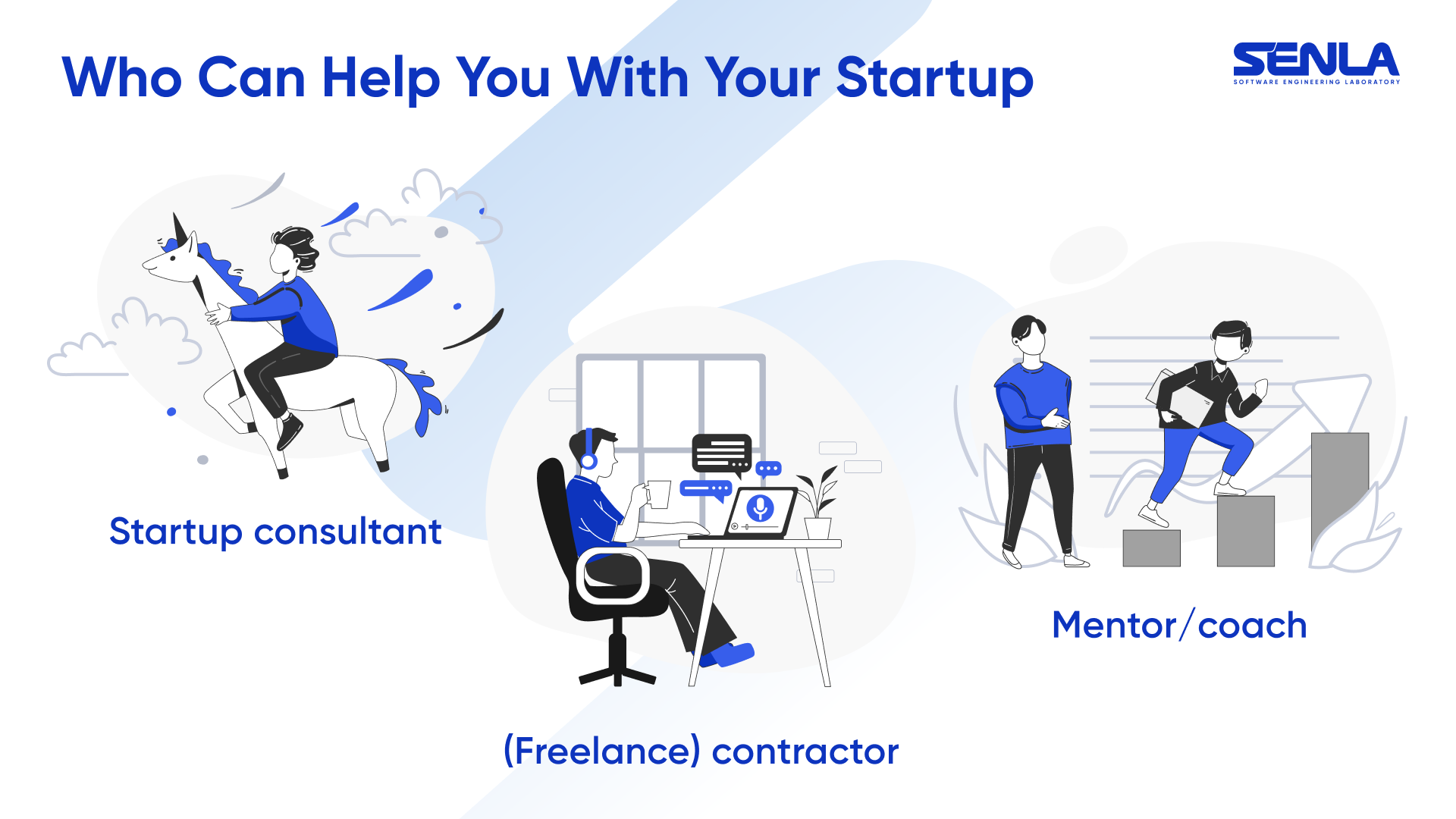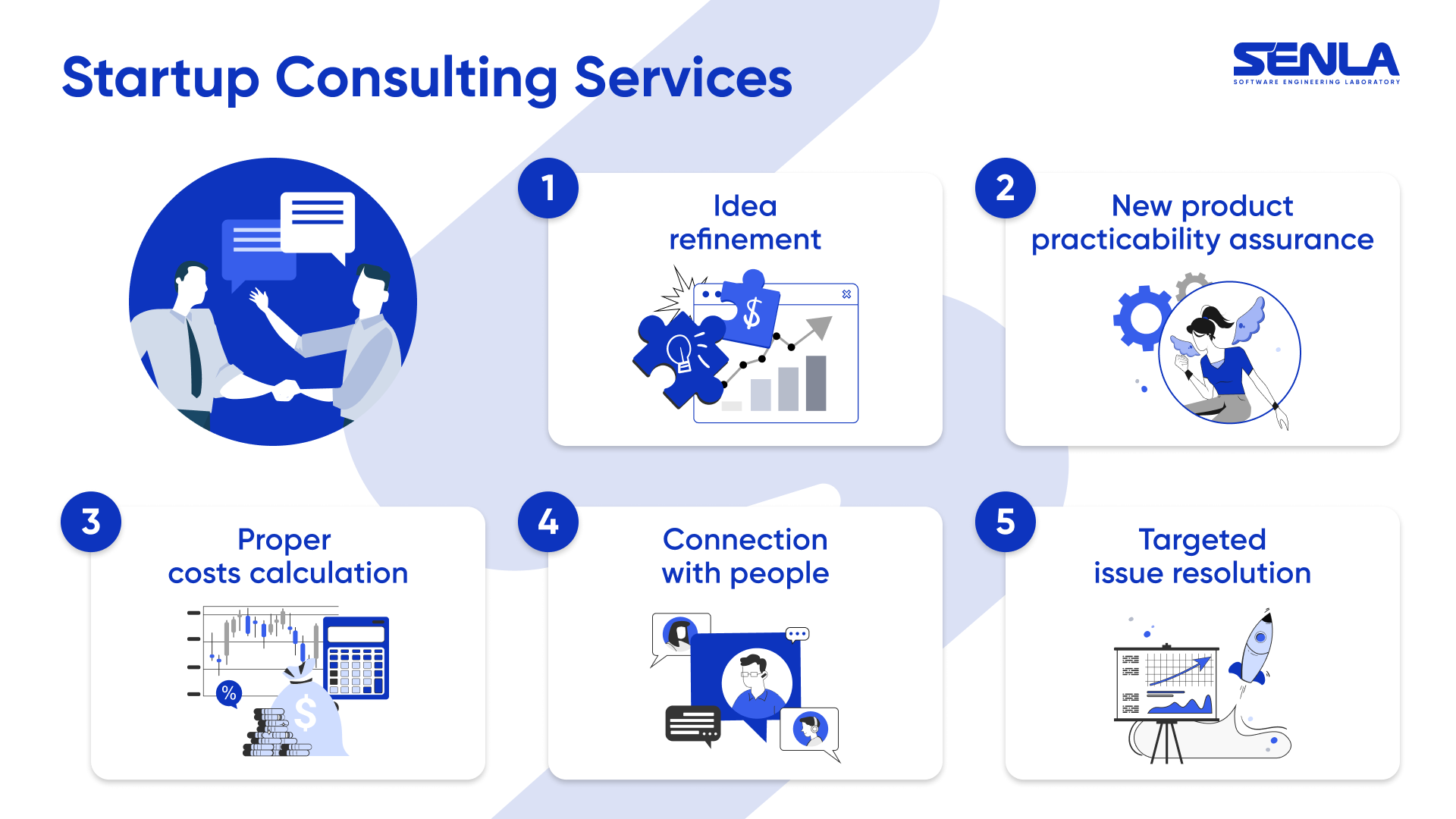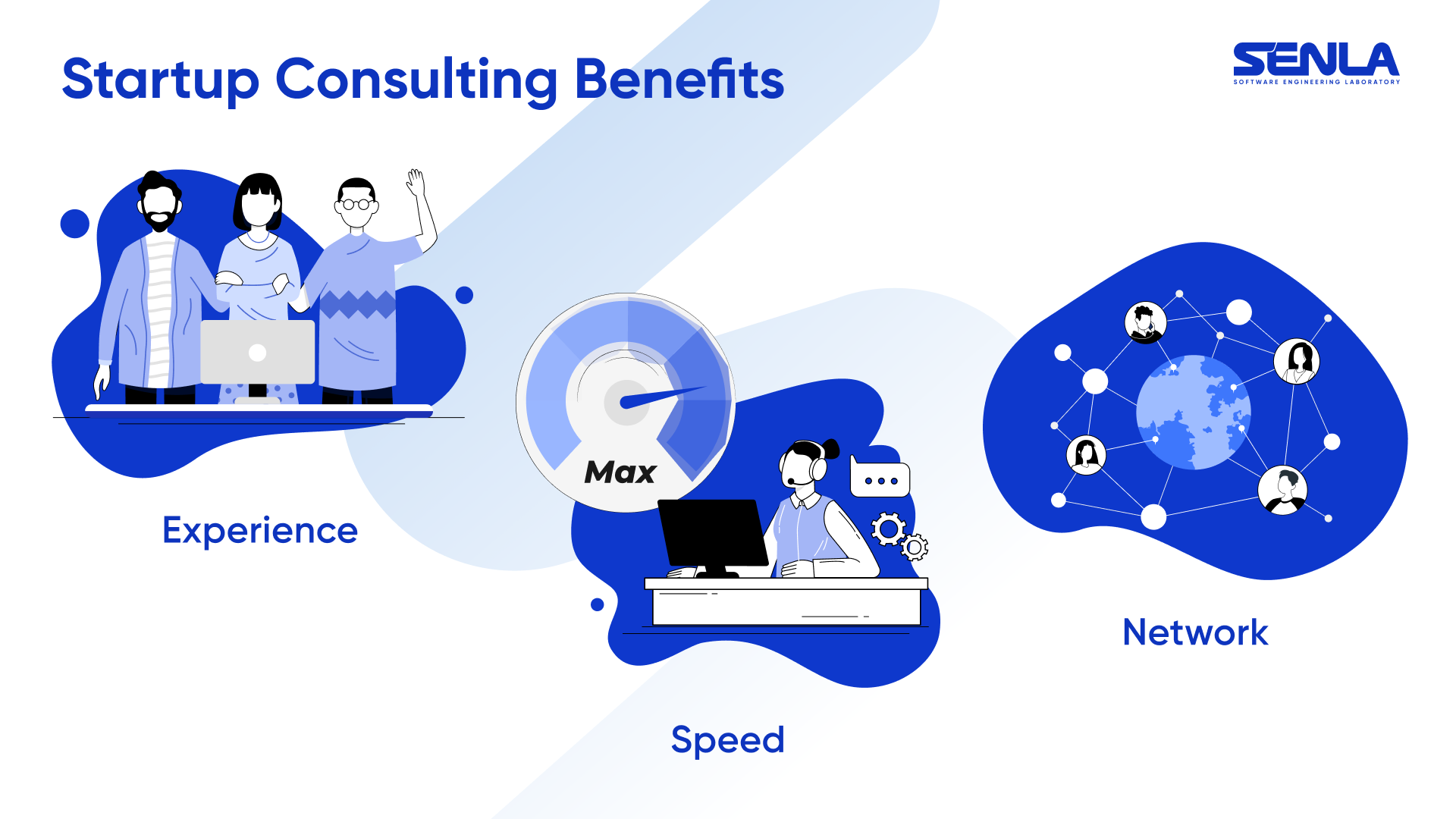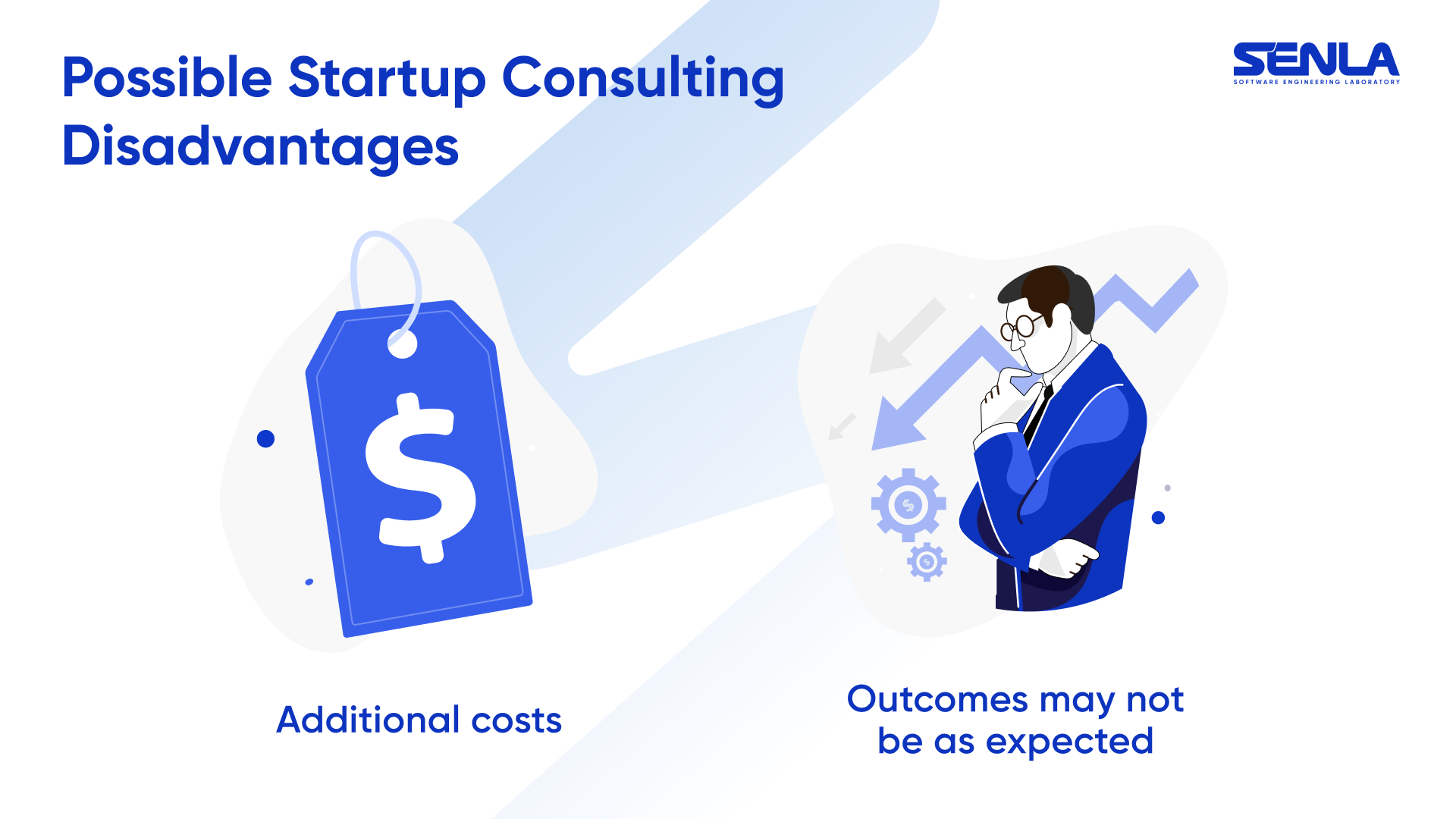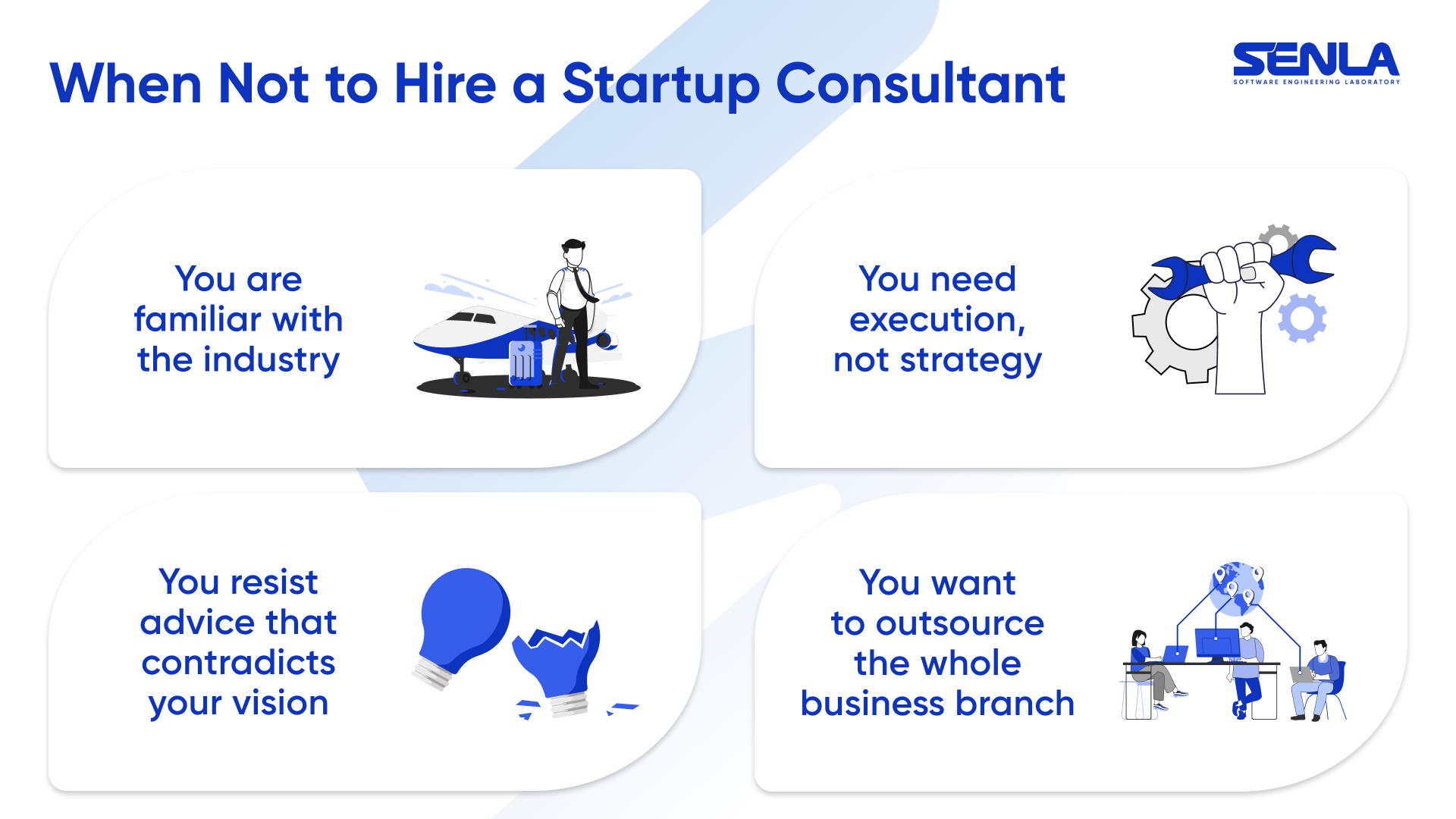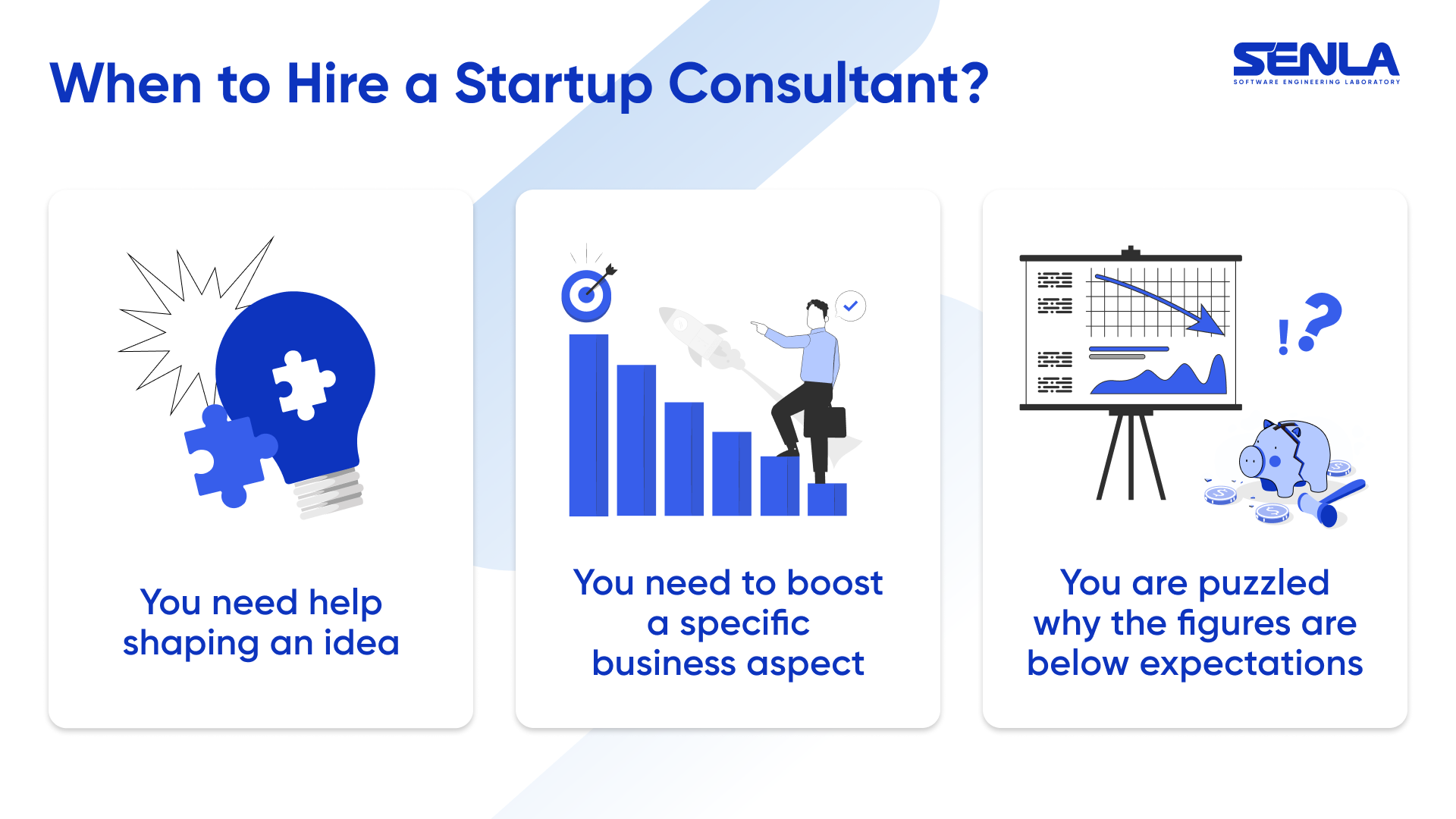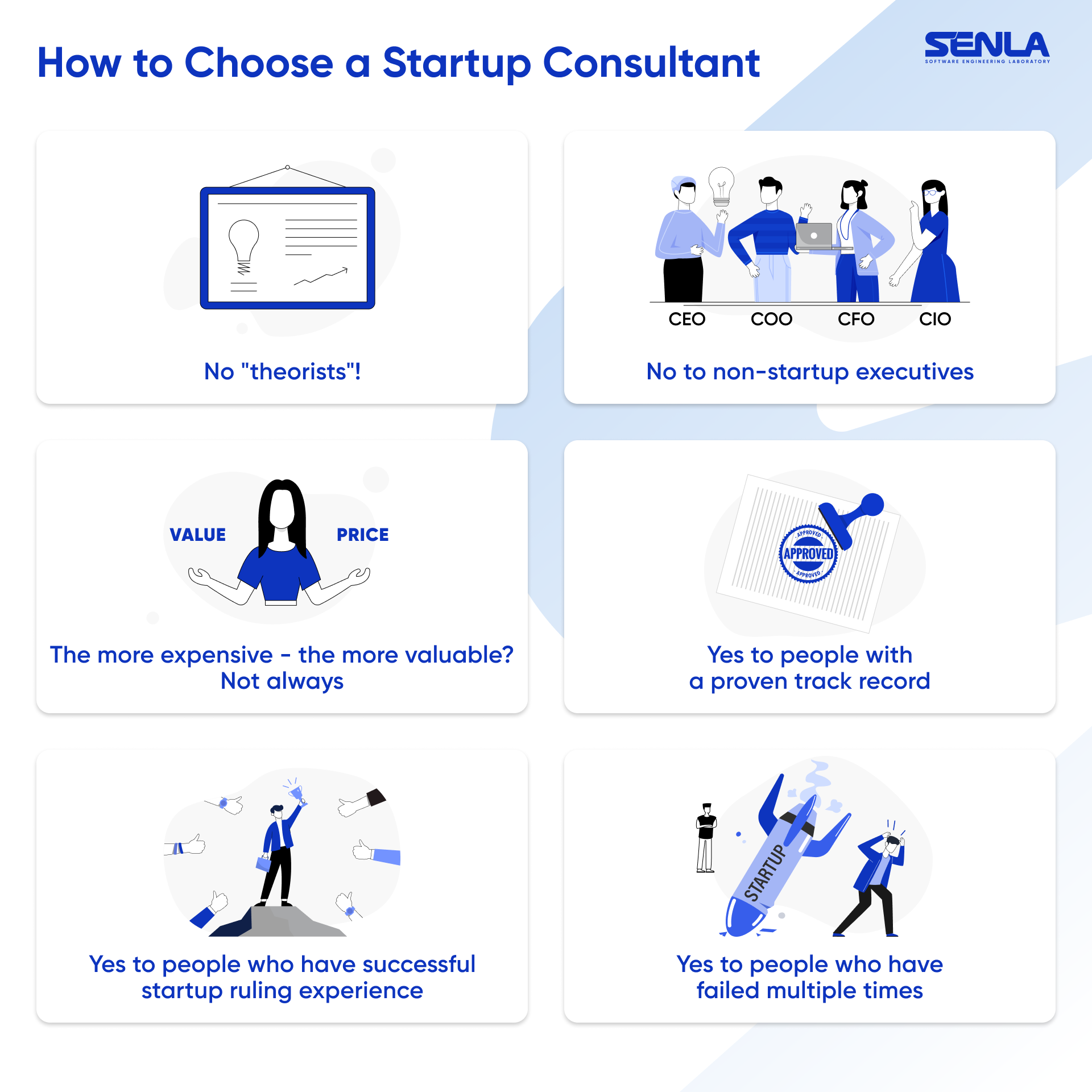Foreword
There are many controversial opinions about hiring a startup consultant, each having its own theses to prove the point. Because of this ambiguity, it may get hard to come to any decision.
This detailed guide, dedicated primarily to startup founders, tries to dispel all the doubts and set sail once and for all in the area. The advice given is based on the expertise of a company that itself grew from a startup to a Fortune 500’s approved firm.
What is Startup Consulting?
Let’s start with clearly defining it as there may be certain ambiguity in the term. Startup consulting is essentially a session (or several sessions) with an expert who assesses your business and gives detailed guidance on what to do to achieve the desired results. Startup founders turn to consultants because running a startup is an extremely sloppy road with lots of pitfalls, which is especially tough for newborn entrepreneurs.
In fact, there are so many potential threats for a startup that even a slightest, seemingly innocent occasion may eventually become a killer for your creation. Below is an infographic showcasing primary reasons of startups' failures (data by CB insights).
This is why this service is relatively popular – bringing in someone seasoned significantly increases the chances of not joining those lists.
Or not?
Well, very soon you’ll find it out, keep on reading.
Sometimes founders may have a distorted perception of startup consulting. As a result, they turn to the people engaged in other areas. Or, they may know what it is but fail to realize they need something else.
Let’s define some of the most popular startup services so that you always knew exactly whom to choose. All specialists that provide services for startups, generally fall into 3 clusters: startup consultants, freelance contractors/contract hires, and mentors/coaches. Let’s take a look at each in detail.
- Startup Consultant. These people are hired for a short term to address a specific matter, e.g. developing a business strategy. They have extensive expertise in the area and a large contact network. This constitutes their high value for business and an according price tag. They are not typically involved in everyday business’ operation and are not a part of a team but are rather focused on a higher-level strategy.
- Freelance Contractor/Contract Hire. If you need execution rather than advice, you go to these people. They are typically hired for accomplishing certain business tasks, e.g. running a marketing campaign. The rate level is usually lower and during work, they join the team. Depending on the volume and complexity of the project, the term of service may stretch for quite long.
- Mentor/Coach. These people are mainly introduced to give startup founders valuable general advice about the functioning of a business. They are not paid and have the least degree of engagement among the three types. Usually, mentors are the people familiar to a founder which is why they agree to guide the person. Often these are C-level executives, so the advice they give is of high value.
Now that we are through with defining startup consulting and coining its position among other services, let’s take a look at how it can benefit your business.
What Services Can Startup Consulting Include?
There is a number of them:
1. Refinement of your idea
This is a basic service that touches the very core of any startup – the idea beneath it.
Sometimes you may not be able to correctly estimate the market and will come up with an idea that won’t settle in. A startup consultant will handle the situation with a professional and educated approach. Based on their experience, a person will help tailor the idea to the exact market requirements.
This may even cause a significant deviation from the initial concept but you shouldn’t be afraid of it. It is much better to have a vivid idea, albeit different from what was originally in mind, than to flush your money and efforts down the toilet.
At the end of the day, which of the things ever reached us in their original form?
2. Ensuring practicability of a new product
You are done with shaping the idea and have it clear as never. Now it’s time to build the product.
That’s where another trap is waiting – the one called perfectionism. Many fall prey to it because they want to perfect their product before presenting it to the world.
In fact, such striving does more harm than good. It wastes your time and drains your resources for the development of the things that may prove useless, or even harmful. Then you will need to spend additional money on their removal later on.
You can’t be sure how people will react to your product – maybe they need a different set of features than you plan to offer. This is why ample functionality from the beginning is odd.
The right approach would be to start with the minimal set to support your idea – that’s what an MVP is – and then to collect feedback to know what people actually need. Then you will be able to invest in the proper development. Remember, “no market need” stands 2-nd in the list of startup failure reasons.
And that’s where a startup consultant can be of extreme value – the person already knows the industry and can assess which features would be useful and which – not.
3. Proper calculation of costs
Costs are such a tricky thing that is often impossible to properly calculate in advance. You know Murphy's law – "Anything that can go wrong will go wrong." And, of course, it will drag your money alongside.
What’s worse, apart from these sudden complications, a budget may simply be improperly submitted from the beginning. A founder may not realize the real necessary amount of resources for building an MVP or performing field testing. A consultant who has dealt with it in the past will, first, give a more realistic estimate and second, allocate a certain amount for unprecedented circumstances.
Another benefit of engaging a startup consultant is that startups in some countries can use special legal benefits. They can become eligible for lower taxes or any other form of governmental support. You may not know about these opportunities, but they will help you save money, so necessary in the beginning.
There are multiple finance-related aspects that you may not be aware of, unlike the person who has been engaged in the industry.
This is why by involving a consultant you can entrust such a responsible task as budget counting to a professional.
4. Connecting you with people
Another benefit of engaging a startup consultant is the possibility of getting exposure to their network. If your consultant is a seasoned professional – it can be quite broad.
They know people who can significantly assist bringing your idea to life. So you can ask a consultant to introduce you to them and leverage their networks.
These connections may be of 2 types:
- An execution team. Consultants have once worked on their projects just like you are now. And they’ve also hired people to perform work. Consultants have seen rough times with these teams and learned how to choose the right one to withstand the difficulties with minimal losses.
There’s even a possibility that a consultant has retained connections with his or her previous teams and can introduce them to you. In this case, you will receive a seasoned team that knows how to deal with startup drudgery. But even if they don’t – they can still help you hire the right people thanks to their experience. - Business executives, who can give you some valuable guidance or feedback on your product. Some may even move on to become your first customers. This will be a perfect starting point for customer development that will help to guide it in the right direction.
5. Targeted issue handling.
This service will be helpful in later stages. Now you may need help with marketing, sales, business strategy, or whatever other areas that won’t grow along with your business.
Engaging a highly specialized professional will not only help move a stubborn function forward. It may potentially skyrocket it.
These were some examples of how startup consulting can benefit your business. Obviously, the list doesn’t end here. Сonsulting can include the most diverse services, you just need to find the right professional.
We will tell you how to do that a bit later. Now let’s move on to all-around analysis of startup consulting.
Pros of Startup Consulting
What startup executives order it for.
1. Multi-year experience, instantly brought to you
Whether you are hiring a startup consultant to develop a strategy, validate a chosen business course, evaluate your assumptions, or for whatever reason that may be – the person might have much more knowledge in the domain than you, especially if it’s your first business.
Even if you were once engaged in such activities, the things that worked for a startup several years ago may not necessarily be working today. Or, you may simply be lacking industry-specific knowledge.
The people who are constantly immersed in the startup ecosystem are aware of the latest trends and know what works precisely for the industry you’re running a startup in.
2. Guidance to avoid potholes and succeed faster
Good consultants have extensive experience in startups’ growth. Their prior experience in the implementation of various strategies and tactics helps them successfully work with startups today.
Whatever you plan to do, chances are, they have already tried that. So, they can help you avoid making the same mistakes. Therefore they can guide you to replicate success.
This will save you lots of time and stop your own mistakes from derailing the business.
3. A network of potential clients or suppliers
Consultants have large networks. They know the top experts in the region or industry. Hiring one may open you a gateway to all these people via personal recommendation – which instantly gives you credibility unlike reaching out solo.
Hence, it increases the chances that someone from the network will get interested in your business. They may become not only your clients but also suppliers, investors, and whoever else for no additional price. It’s a great deal for any newborn firm, isn’t it?
Possible Disadvantages of Startup Consulting
Unfortunately, it’s not all diamonds with startup consulting, it also has a flip side. How big it is, however, – we will try to determine.
1. Price
It is not small, let’s be honest. You need to be prepared for that once you’ve decided that you need assistance.
You could buy some equipment or invest in some software instead. And that is true. Later in the article, we would tell you when this would be the right decision.
Rather approach it from a different perspective: think about how much money this consultation can save, and bring you in the long run.
Achieving results faster means you spend less money on salaries, rents, taxes and whatever else you’re paying to get from point A to point B. Depending on your startup size, this may already be enough to cover the cost of consulting.
Spending the equal sum but getting more at the end. Sounds nice, isn’t it?
There is more, however. Once you achieve the desired results, you may start receiving higher revenue (depending on your goals). If the previous step wasn’t enough to cover the costs, now you only have to calculate when increased income will compensate for the spent money.
Sounds even better, right?
2. The outcomes may not live up to the expectations
This is potentially the most frightening thing for all startup founders that deters them away from startup consulting services. And this has ground to be so scary.
There are stories of CEOs who have wasted money on consultations, barely receiving any results. The report was already outdated upon receiving, the desired (or promised) figures were not achieved, or the consultant simply went off the radar.
The reason for the latter is simply stumbling upon an unreliable person. Unfortunately, there is such a practice when people who have once failed to launch a business go into consulting pretending to own enough relevant knowledge for the industry. This is a very dangerous trap, falling prey to it can result in significant pain for your wallet and business.
Apart from that, all other issues may be caused by several reasons such as hiring a consultant at the wrong time, an unclear vision of the end result, vague goal setting, and the hope to use the consultation to solve problems that are out of its jurisdiction.
Later in the article, we would describe how to avoid all the above-mentioned challenges and maximize the probability of the outcomes to match the expectations.
When NOT to Hire a Startup Consultant
Now that we’ve outlined the pros and cons of startup consulting, it’s time to give guidance on the timing. Choosing it wrong may well result in wasted money, time and nerves.
First, we would describe the reasons when you should refrain from using a consultant’s services.
1. The industry is not new to you
In this case, it may do more harm than good. Your vision may be different from that of the consultant which may lead to a conflict.
A consultation is quite a costly affair for a startup overall, especially for an early-stage one. But when there’s a ground for mismatch, the ROI from it may even be negative.
This is why if you have some expertise in the domain and, more importantly, are sure of it – it’s better to refrain from a consultation to avoid a potential waste of money.
In this case, it will be good to first establish a more or less decent basis to have both relative stability and funds and then think about additional consulting if necessary
2. You need execution rather than advice
Again – that’s not the case for consultants.
If you feel you need assistance with any practice-related side of your business – welcome to the contractors. You may bring in a freelancer to collect information on platform users or hire somebody full-time to process phone calls. Or conclude an agreement with an outsourcing partner.
Whatever is the task involving day-to-day operation, a startup consultant is not the right person to address.
3. You are not ready to accept the advice that contradicts your vision
Be honest – are you actually ready to bring in a person whose point of view may significantly differ from your tightly set ecosystem?
Sometimes it may only seem that you are. In practice, you will be actually expecting to hear something that will help move the business forward but within the boundaries of your perception of its operation. While to actually overcome a plateau, you may need to do something totally different.
Ask yourself – are you ready to take a turn or go down a completely different path? Do you trust somebody enough to adhere to what you’ve heard and guide your business alongside it?
Only if you give a solid yes to it you can move on to book a consultation. Then you will be sure that you won’t pay for the advice that would end up lying somewhere deep in the drawer covered in dust.
Otherwise, your money may well fly away with the wind.
4. You want to outsource the whole branch of your business
This point is not as strict as the previous ones since there may be exceptions. To become this exception successfully, though, you need to know a couple of things.
First, you need to be as specific as possible. The more, the better. This is what we meant under “poor vision of the end result” before.
It may work to come to a consultant with a problem like “My marketing doesn’t perform as well as I want” and receive proper guidance after several sessions. A much better approach, however, would be to form a specific inquiry like “I want to utilize SEO as my main marketing channel”.
What concerns the end result, here you simply have to be specific, otherwise, you won’t be able to measure how well the consultation has paid off. As challenging as it may be, you need to come up with at least relative figures of what you want to achieve.
To make things easier, it can be worked out together with a consultant. A specialist will help you determine the required levels for your business. But it has to be done as the phrase “I want more filled forms” may mean 100 unqualified leads that will waste your marketing budget. And it may also mean just 2 or 3 MQLs or SQLs that would later convert and triple the amount of money you’ve spent on promotion.
Second, you need to form the tasks clearly. This correlates much with the previous point but has a bit of a different angle.
While preferable, of course, to ease both your and your consultant’s job, this advice may be omitted as you may simply not know something in a domain, why actually you are contacting a specialist. But in case you have any guidance or a vision of how you believe things must be done – state it immediately. It will ensure you both will be moving in the same direction and you will not be disappointed with the results.
Finally, the third – be ready for a completely different point of view for such a complex inquiry.
Overall, it’s quite an unreliable ground on which you should step only having big confidence in the decision. Otherwise, it’s much better to reach a startup consultant with a traditional reason – targeted improvement of a certain business aspect. In this case, a consultation has much greater chances of satisfying you with the outcomes.
When to Hire a Startup Consultant
All those frightening moments that we’ve outlined in the previous section should not make you abandon startup consulting for fear of not reveicing any real value.
Consulting can be beneficial. In fact, it can even be a holy grail sometimes.
The previous section was mere guidance when the timing was bad, now we are going to tell you when it is perfect.
1. You realize that you may need help shaping your idea
This is that exact case when you should involve a consultant from the very beginning. Again, only in case you feel this initial help is necessary.
It may be a new industry for you, new geography with its peculiarities, or simply a new market – B2B for instance. When you are not confident enough that you have a proper MVP – consider involving a startup consultant.
As costly as such an investment may be (not all consultations are equally THAT expensive, by the way), without it, your idea may simply not flower – making the rest of your efforts simply meaningless. In this case, allocating that money for a consultation may turn into a must, saving your startup from a potential failure.
2. You need to push a specific aspect of your business forward
Another great cause to reach out to a consultant. Be it not working marketing, poor sales offer, unclear business strategy, or plateauing revenue, – these are all cases for startup consulting as a best way of handling targeted issues.
An expert will independently assess the situation based on their broad experience and knowledge of the current state of a business and the market.
Involving a consultant is also good because you bring in a person from the outside of your business. This way you receive a stranger’s view – the one that may uncover what is invisible from the inside.
3. You don’t understand why your business is not showing the expected figures
One more cause to consider startup consulting. Sometimes you may think that you have put everything in place and worked everything out. But something still wouldn’t work.
Something in that meticulously set up chain is preventing the whole machine from running properly. And you just don’t know what. This is the moment when you should turn for help.
Just like with the previous point, an expert estimates the state of things and figures out what’s causing problems. You will be given a clear and detailed guide to follow.
Now that we’ve discussed all the pros and cons of startup consulting, it’s time to move on to the next aspect – choosing a proper specialist.
How to Сhoose a Startup Consultant
This is a crucial step as your choice directly affects the outcomes. Let’s make sure they will be as planned.
1. No to “theorists”!
Strict NO to anyone who doesn’t have any entrepreneurial experience! Even if this person is a business school graduate. Classical institutions traditionally tend to focus on theory, meaning they hardly provide any hands-on experience. Only recently top business schools have started tailoring their programs towards entrepreneurship and startup management.
The reality, however, often has potholes. Be it a sudden product refinement, costs increase, or a failed supplier – we don’t plan on these things and have to adapt if they show up.
Adaptability and contingency planning skill is what actually matters. That’s why personally undergoing changes and being responsible for every decision is way more valuable than learning success stories and case studies of large corporations’ failures.
Take COVID, for instance, in 2019 we couldn’t even imagine all those limitations. But businesses had to cope with unprecedented circumstances to stay alive.
As a result, many ceased to exist, including startups. Yet, even those who managed to attract millions of dollars of funding by that time were facing tremendous challenges.
This is why practical experience is so important. A person knows how to apply theory with regard to the current state of things.
2. No to non-startup executives
There are people in startup consulting who happen to have practical experience on A-C levels. Or those who graduated from business schools, with enterprise-level MBAs training.
At the early startup stages, you should refrain from their services. The reason is that a startup’s operating conditions are different from those of established businesses, particularly in two aspects:
- a startup has a much smaller budget;
- a startup operates with much less certainty.
This domain requires specific knowledge, tailored to these peculiarities. What works for a large business may turn deadly for a startup.
You should only choose the people who themselves are/were engaged in a newborn business operation. Otherwise, the advice received may not work or will require resources you currently do not have.
3. Choose the people with a proven track record
If you see anything suspicious in a consultant’s portfolio – perform justification research. Ask about their previous experience. If possible, talk to the people the person worked with – try to find out why the track record is not perfect.
It may simply be some founder’s failure to implement recommendations. But in this case, a startup consultant should have positive outcomes from other collaborations. Otherwise, you won’t be able to make a credible judgment.
If there is no strong ground to support a person’s reputation, it’s better to refrain from such a partnership. There are many other consultants with affordable rates who don’t have these flaws.
4. The more expensive – the more valuable? Not always
Let’s look into the topic of affordable rates a bit more.
Just like any other service, startup consulting can be overpriced. It may happen when a consultant only starts this business and gets first results. But one example is not illustrative, so high rates won’t reflect the actual value. Another situation is when a person has several successful startups behind their back and also sets unreasonably high prices.
A consultant should have a chain of positive engagement outcomes for the rates to be reasonably increased. Then it will be clear that consultations actually work and it’s not a coincidence. And that they’re worth paying more.
“How to justify if the price is right?” you will ask. Again, there’s only one answer – research. Determine for how long this person has been consulting and how effective their recommendations are. Compare to other experts on the market with similar track records. The more time you devote to it – the more likely the consultation is to be paid off.
5. Choose a person who has a successful startup managing experience
People who have achieved decent results in charge of a startup are of extreme value. They have accumulated vast knowledge of working strategies throughout their work. Their advice may significantly cut your way up.
You can follow such guidance being confident that it has already been backed up by practical results.
This is why a great candidate for the role of a startup consultant is a (former) CEO of a successful startup.
Or…
6. Choose a person who has failed multiple times
… or a former CEO of several unsuccessful startups.
Yes, that’s the other type of entrepreneurs perfect for startup consulting.
These people know what surely wouldn’t work in the industry – they have learned it the hard way. And they can help you avoid these things.
This is also an extremely valuable experience. And it can be bet on when choosing a startup consultant.
SENLA Startup Consulting Services
We specialize in IT consulting.
Let us quickly introduce ourselves and what we do.
SENLA (Software Engineering Laboratory) is a custom software development firm. Our history goes back to 2012 when it all started. At that time, the company was a small startup with as many as 10 employees, all in a single room.
During subsequent years of growth, we have accumulated valuable experience and established ourselves a place under the sun as experts in the area of custom software development. Now, we are ready to share this experience.
We have a dedicated highly experienced team for providing a whole range of startup consulting services. Starting with a simple business analysis in the domain to determining the idea’s practicability, we can assist you with creating design wireframes and, ultimately, building your own application.
Such an approach, along with constant knowledge sharing among the team members, allows us to be reassured of the reliability and relevance of the services we provide.
Following are the reasons why you can consider us for your startup consulting needs:
- We have a successful business administering experience. We have tailored a small startup to the size of an international company with 600+ employees in 4 countries. This allows us to assist with confidence.
- We have experts in various areas. Regardless of the type of services you need, we can provide you with top-class specialists in any industry to assist you in pursuing your vision.
- We specialize in working with startups, along with SMBs.
- Consulting is not our main source of income. It means that we don’t have to carry out a certain number of consultations per month to sustain our well-being. That, in its turn, allows us not to tie a price tag on every word and focus more on the delivery itself.
- And finally, the most important – we have a proven record of working with startups. Throughout the span of our career, we have helped a number of them to implement their visions, like with this Israeli company. At the moment, we also have several startups we are working with.
By choosing SENLA as your consulting services provider, you make the right and reliable investment into the future of your new business. Visit our startup consulting services page to learn more about how we assist startup founders in turning their ideas into tangible and selling business products.


